Wallflower Farm: How Fred, Kerri-Ann Mpagi blossomed thriving flower farm
On their thriving flower farm Kerri-Ann and Fred Mpagi are growing their family and their business. It’s a beautiful life and a world away from the slums of Uganda where Fred was orphaned at age 11.
Brisbane News
Don't miss out on the headlines from Brisbane News. Followed categories will be added to My News.
Lush paddocks line the narrow road to Kerri-Ann and Fred Mpagi’s home, which sits against the dramatic backdrop of Delaneys Creek State Forest and Mt Mee.
As the sun sets, the filtered light illuminates the rows of sunflowers, zinnias, celosia and statice.
It’s this time of day when Wallflower Farm, the couple’s 5.6 hectare flower farm at Wamuran, 50km north-west of Brisbane, is at its most beguiling.
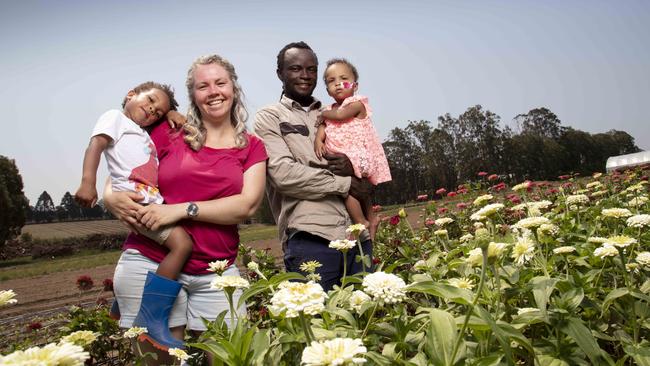
With a well-earned wine in hand, Kerri-Ann and Fred, both 34, take stock of their private paradise while their children Malachi, 3, and Africa, 14 months, play with the farm dogs.
“Farm happy hour is what I call sunset drinks on the farm,” Kerri-Ann says.
“Sunset is the best time, that’s my reflective time – to just enjoy the farm as it really is.”
The serenity is the pay-off for the family’s tree-change two years ago, from suburbia in Petrie.
“I grew up on acreage, and I loved it,” Kerri-Ann says of her childhood on a strawberry farm on Gympie Rd, Aspley.
“A lot of people seem to remember the strawberry farm being there.
“Fred and I decided we wanted a bit of space for the kids to run around on, but we didn’t want the space to go to waste so we thought, ‘What can we do with acreage?’
“We joked about having a cut flower farm. That was just a random conversation at a cafe … we even talked about a goat farm or a pig farm but somehow we found a property that was perfect for growing cut flowers because it came with cold fridges.
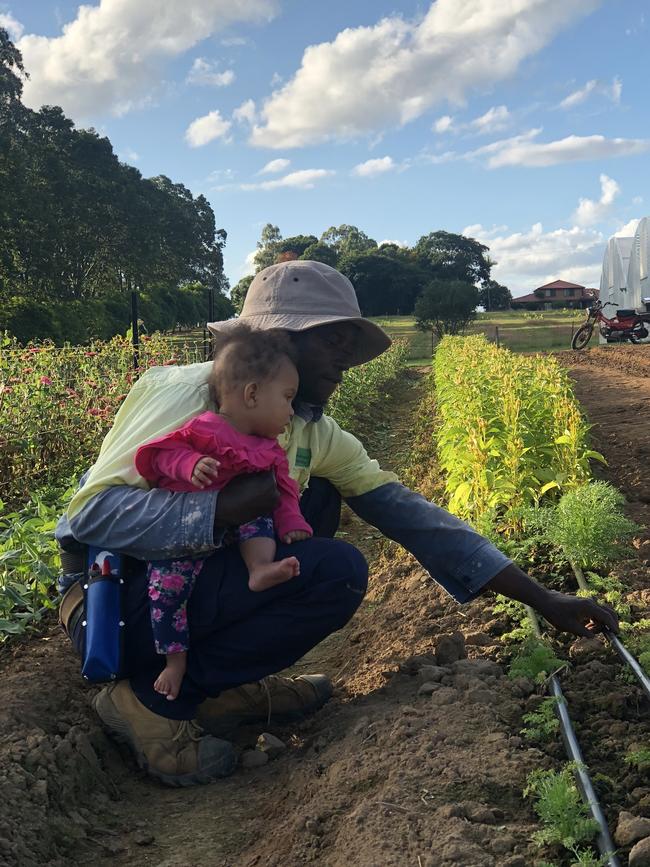
“My sister Renae is a florist – she owns Wallflower Floral Design at Sandgate – and my dad and mum have run plant nurseries, so I have grown up in that sort of industry.”
We are chatting on the front porch of the family’s low-set brick home, seated at a timber table long enough to accommodate a dozen friends and family, which it often does.
Most recently it was decorated with florals and foliage for a family Christmas party.
The setting is a world away from Fred’s homeland of Uganda, but Kerri-Ann says her “hardworking” husband has made an easy transition to life as an Aussie farmer.
The pair met when both were working for the Australian branch of the Watoto Child Care Ministries, which supports orphans and widows in Uganda.
Kerri-Ann was the tour co-ordinator for two six-month Australian tours by the ministries’ children’s choir in 2012 and 2013, while Fred worked as a lighting technician for the concerts.
“I worked closely with him on the tour,” Kerri-Ann says.
“From the start he kind of liked me, but I was a bit reserved. I was very busy with my job. There was something about his character, he was very hardworking and very honourable. My family loved him.
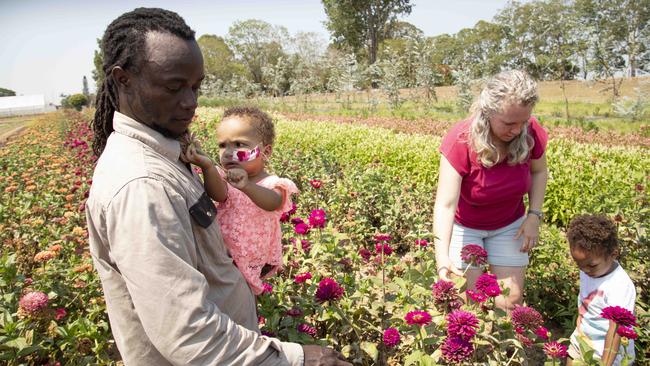
“I used to always be a little reserved in relationships, but for some reason with him I sort of knew it was the right choice. Something sort of clicked.”
Fred moved to Australia in early 2014 to be closer to Kerri-Ann, they were engaged by May and exchanged vows at Maleny Manor in the Sunshine Coast hinterland in the December. Kerri-Ann’s sister Renae did the floral arrangements, of course.
“I had peonies – which I would love to grow but can’t (in these conditions) – and silver dollar and lots of pastel colours.”
For Kerri-Ann, life on the farm is a return to her childhood, and it was her father who taught her much of what she knows.
Having moved on from the Aspley strawberry farm and retail nursery, her dad Ian Handy now runs one of the state’s largest wholesale nurseries at Elimbah, also in the Moreton Bay region.
This is where Fred, who spent years working at the nursery, learnt many of the skills required to manage a farm.
“Freddie has learnt a few things about growing things, and machinery. Dad actually helped us find the property. It’s been great having his input,” Kerri-Ann says.
The couple welcomed little Malachi in 2016 and daughter Africa in 2018.
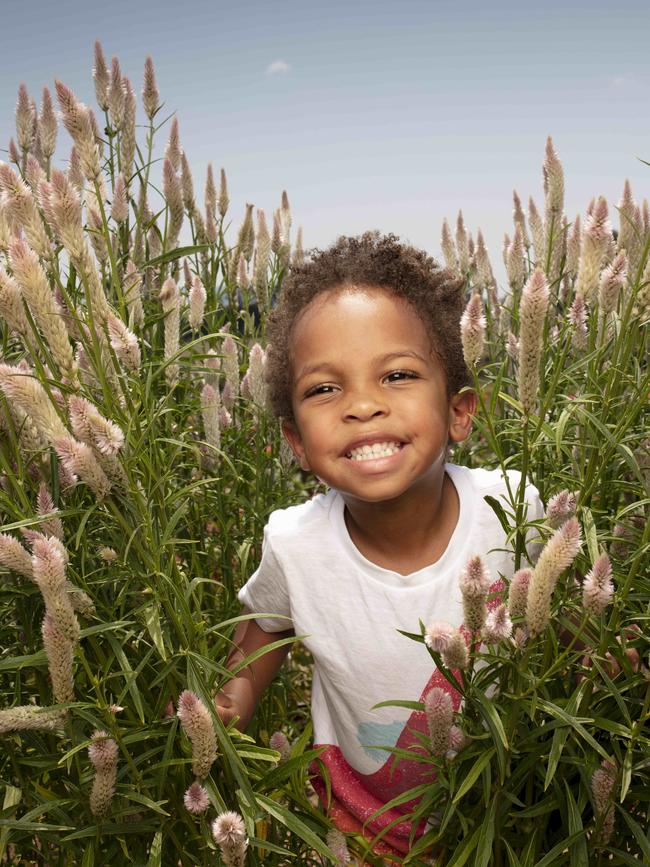
“Life has changed a lot. Prior to Malachi, I was in an office job in Slacks Creek (with Watoto). Fred was working in the nursery. Now we have a lot more space to move around, we have a lot more time to do things with the family.
“Malachi spends a lot more time outside now, which I love. We’re hoping for a horse for the kids when the kids are older.”
Friends and family, most of whom also live just north of Brisbane, often converge on the property.
The couple’s next step is to build their forever home on the property, perched on a hill overlooking the most colourful backyard any family could, hope for.
“Our friends love coming here because it’s so peaceful and quiet. Often when they come over they go home with flowers. I have a mums’ group that comes over and we’ll have a picnic at the dam, under a tree,” Kerri-Ann says.
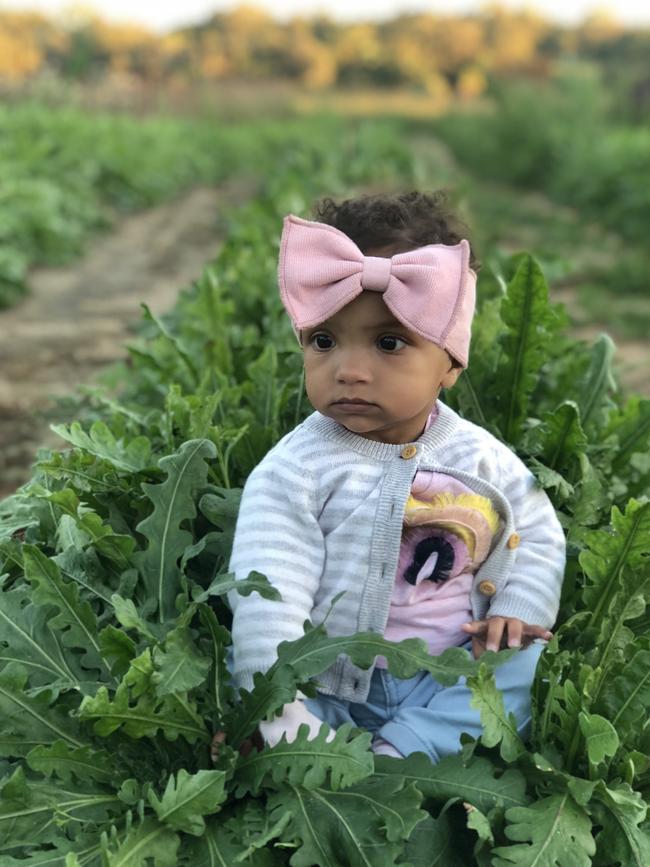
Fred’s day starts at about 3am, when he begins the routine of watering, fertilising and planting.
Flowers are harvested each Sunday and Wednesday, the days before Brisbane’s booming wholesale flower markets, which supply most south-east Queensland florists.
Kerri-Ann takes care of administration, marketing and their young brood.
“At our really busy times Fred will be harvesting during the day and then late at night, after the kids are in bed, I’ll help with quality control and order slips.”
The family employs a staff of two to help Fred, who is often joined by their “junior” farmer. “Malachi helps, I think he think she’s helping,” Kerri-Ann laughs.
“He’ll play around with the dogs and picks flowers.”
The youngster has another important role – as a regular face on the farm’s Instagram feed which features a vibrant catalogue of snaps from the property, some of them with a cheeky Malachi peeking out from behind freshly cut blooms, or a tiny Africa sitting in a sea of colour.
“I get him to take photos a lot … he’s a bit of a poser,” the proud mother says as she turns to her little son who has appeared at the table.
Malachi points out a storm is coming, and sure enough, raindrops begin to ting on the metal porch roof.
Recent downpours, while welcome, have wreaked havoc. One deluge was so intense it washed nutrient-rich topsoil from the flowers, triggering more work for Fred to replace what was lost. The problem is a twist on what has become the norm on the farm – many dry months.
“We haven’t, thankfully, run out of water yet. We’re actually quite good here; we’ve got a dam and a natural spring, but we try not to use too much. My husband has lowered the amount of water we use to try to conserve water,” Kerri-Ann says.
“I think people see the flowers and think ‘you must float around the place’. It is that, but it’s also a lot of hard work.”
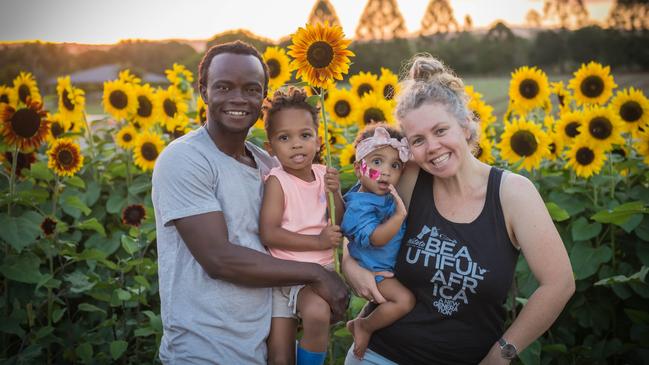
Inside the couple’s house, the rooms resemble a florist shop.
Atop the entertainer’s table on the porch, burgundy blooms of black knight scabiosas spill from a clear vase.
Elsewhere, jars and empty bottles are filled with flowers at different phases of their life cycle.
Kerri-Ann is testing their “vase life”.
The couple trials each type of flower after it is cut, using different treatments for different varieties, all in a quest to ensure their lovingly grown blooms last as long as possible at their final destination.
“We’re still learning things – we learn on the job pretty much. We have a lot of different flowers all around the house. I forget to throw them out.”
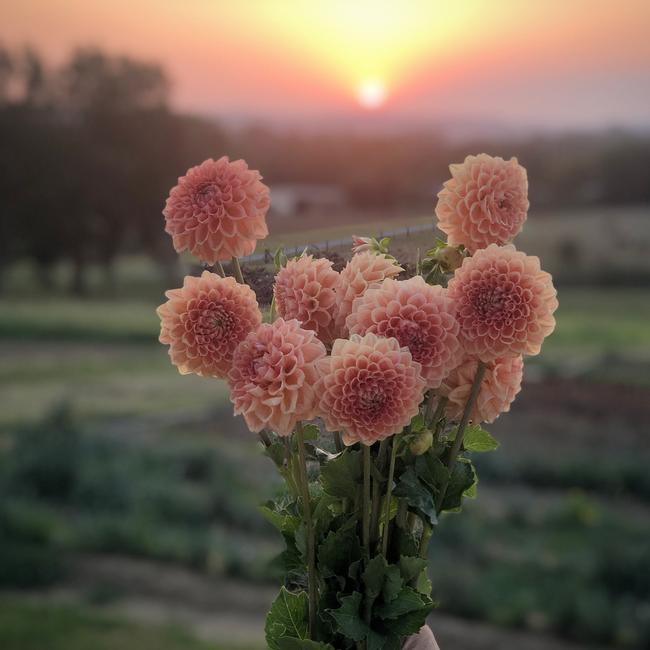
Flower crops are constantly rotated but Kerri-Ann prizes one bloom above all others.
“Dahlias. I don’t know what it is about them, they’re just so pretty and there’s such a variety of styles.”
But dahlias are also the most challenging to grow as there is no way to guarantee the seeds of the plant will produce the same colour flowers. It can make the process something of a lottery.
“It’s crazy, the genetics of dahlias; when it starts growing it’s sort of a surprise to see what colour it is,” she says.
“My husband always brings me the first bloom.”
FRED’S STORY
Life is beautiful for Fred Mpagi, but it was not always so.
The eldest of six children, he was raised in the slums of the Ugandan capital Kampala.
By age 11, he had lost both parents and a younger sibling.
“We had to fend for ourselves, with the help of relatives here and there. Those were tough days.”
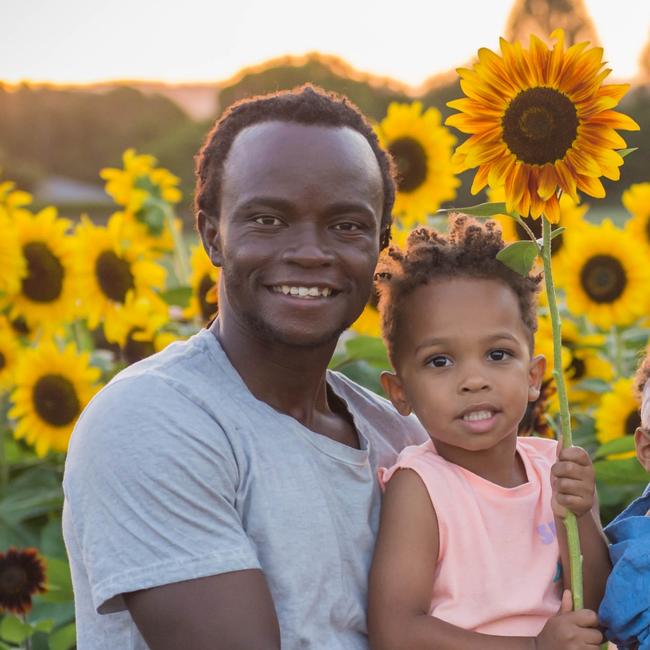
As he grew, the Watoto Church became a haven for the teen, a place of safety from the rough streets and a source of hope for a brighter future. The church helped with the cost of education and offered programs to help Fred avoid the drugs and crime of the slums.
“The church was more a hiding place … being raised in a slum, you stay in church and have a better life.”
Filling his life with learning, Fred became a youth worker at the church and volunteered as a lighting technician for the church’s Christmas productions and its touring choir. It was the church that pushed him towards success, he says.
“At school I had a teacher who every day would make us recite: ‘Discipline and hard work is the key to my life.’ ”
The saying has formed the basis of Fred’s approach to life, and work, particularly his up-at-dawn routine at Wallflower Farm.
“You plant a seed and you see it grow. In a way you’re in charge of something, and then it makes people happy.”
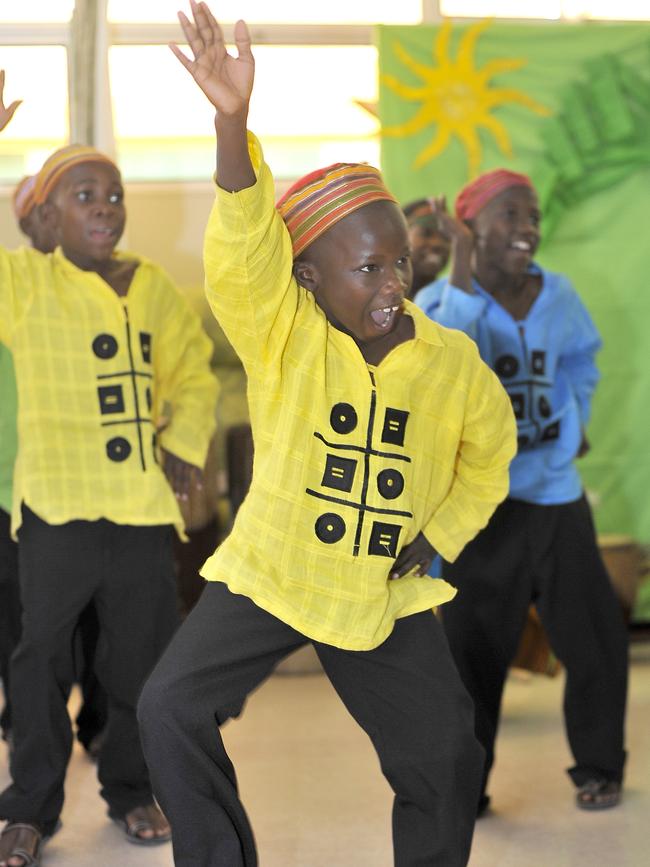
Fred’s ties to Uganda remain strong and he returns there most years, to watch another project grow – mentorship camps.
“In Uganda men don’t really spend time with children … we teach men how to play with children, and children how to be men.”
He says his life’s experiences have helped shape not only his work with children in Uganda, but his own young family.
His primary goal is to simply be there for his children.
“Back in Africa we have a saying, that it takes a whole village to raise a child. And it’s true. My mother’s sister is not my aunt, she is my mother, and my father’s brother is not my uncle, he is my father. That’s a part of my culture that I would love to teach them.”


